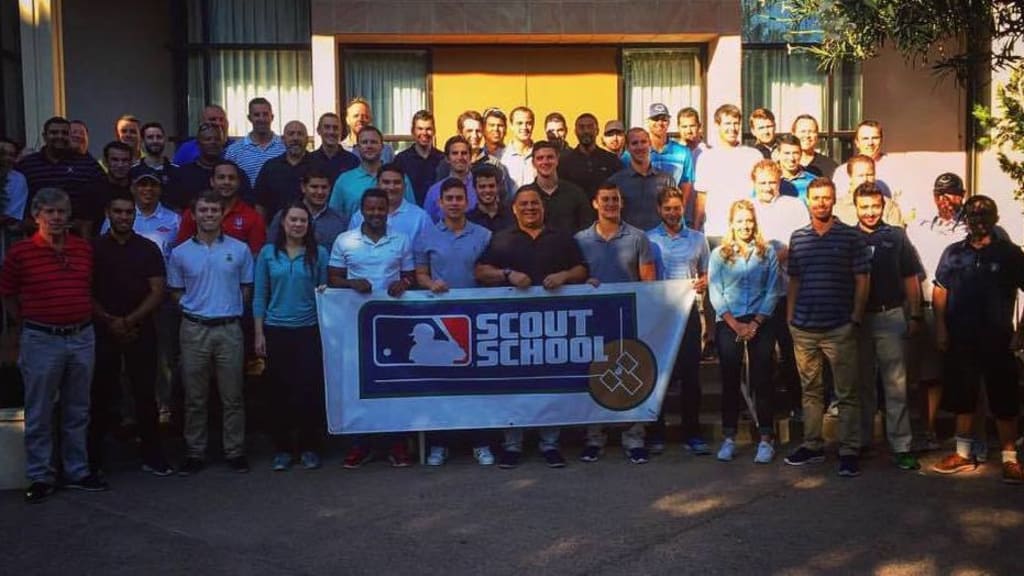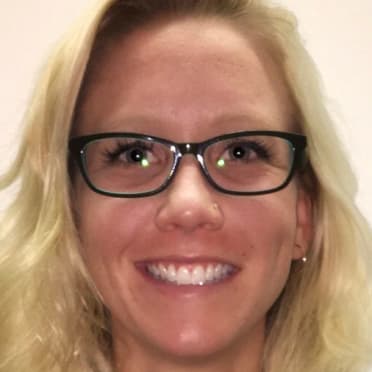Scout school.
It is exactly what it sounds like it is -- a group of students being educated in the realm of scouting, under the tutelage of baseball lifers who spent their entire careers in evaluation.
Until 2017, Major League Baseball’s Scouting Bureau hosted such an educational experience annually, with organizations sending hand-picked participants for the opportunity. Scout school no longer exists in the way it once did, though some clubs have toyed with hosting their own versions internally and all teams have filled any gaps in evaluation that had previously been filled by the Bureau.
The 2016 class, like many others, brought together a host of people representing the teams that sent them, many in different roles with varying backgrounds. Probably also like some others, it was a group of unlikely colleagues-turned-friends in the close-knit and non-stop environment that the school provided, with the highlights of the experience extending beyond the twice-daily classroom sessions and ballpark visits.
Then, John Edman and Julio Ramirez were baseball operations interns for the San Diego Padres and Toronto Blue Jays, respectively. Emilee Fragapane was the coordinator of baseball operations for the Los Angeles Dodgers. Edman, a Korean-American raised in a baseball family in San Diego, is now a data quality engineer for the Twins, helping his team build data pipelines, improve data quality and aid the team’s analysts. (His brother, Tommy, plays for the Cardinals, and his sister, Elise, works as a systems engineer for St. Louis.)
Ramirez moved out of his internship and into a full-time role with the Blue Jays in 2018, and since then, the Venezuelan-Canadian has been the assistant of international scouting based in his hometown of Toronto but travelling far and wide to fulfill his duties.

Fragapane, who hails from rural Northern California and also completed a baseball operations internship to kick off the first of her nine years with the Dodgers so far, has risen to the role of biomechanical quantitative senior analyst. She spends the bulk of her time translating and communicating data to make it useful and interesting for those who can take competitive advantage of it at the field level.
Vastly different roles, incredibly divergent backgrounds, a shared passion for the game and at least one common experience -- scout school.
“I definitely enjoyed my time at scout school, and with my current role, it’s even more helpful now because of being able to integrate the more technical aspects of my job with the scouting aspects that I picked up from scout school,” Edman said.
Added Ramirez: “For me, it was huge, because it was the first time I had a ton of baseball back to back to back. But then to be able to come back, sit down, discuss it, hear what other people saw, how they were thinking about it, talking about it, it helped me definitely come up with more of a process. … I took a lot of what other people were saying, whether it be verbiage or things they break down, and I still use a lot of it today.”
The experience lent itself to education far beyond the classroom setting, with its pupils learning almost as much from one another.
“Having been with the Dodgers my whole career, it was really great to meet other people around the game,” Fragapane said. “Partly for networking but also purely from the perspective of [wondering] what have other people’s experiences been in the game? What are other people’s backgrounds? And just building that up. Now I know people when I go to Winter Meetings outside of just our organization, so even little things like that, the community, it was great for me.”
More than 4 1/2 years have passed since those moments, but there continue to be ways in which the former students can learn from one another by sharing their experiences in the game. Amid a time of much-needed reflection on privilege across the globe and within the industry, it’s easy to see the fortune of just being able to land and pursue an internship in baseball, before further complexities even come into play.
“I’m lucky that I’m from Toronto,” Ramirez said. “Had I been born somewhere else, having to live in this city for the amount that you get paid, that honestly doesn’t seem possible. It really doesn’t. And right there you’re cutting off a lot of opportunities for some people.”
Spending a significant amount of his pre-pandemic time scouting in Latin America and the Caribbean, Ramirez has often reflected on how life might have been. He’s seen the difference between a young player fighting for survival through baseball and the experience he was able to have because of his upbringing in Canada.
“Latin America is baseball or school,” Ramirez said. “And for some, it’s not even school. So you leave school at 10, 12 years old; you have to make it in baseball. You have no Plan B. So a lot of these kids struggle with certain aspects of anything, basic learning. Some of them actually can’t read, can’t write, but it’s not all of them. And you hear a lot of what some people are saying -- it’s very generalized, which it shouldn’t be. It’s just unfortunate circumstances.
“I think about it a lot. If I was born in Venezuela, would I have finished school? It’s a very honest conversation to have, because I look at how my family lives out there, and it’s very different. It’s survival, and what I need to get done to have food for the next day. I can’t worry about going to school; I’ve got to make sure we’re eating.”
Biases are often born out of the environment that Ramirez paints the picture of. Even once they are signed, players might be ostracized or discriminated against at the same time they are entering a new country, dealing with a foreign language and customs, as a young adult whose prefrontal cortex has yet to fully develop.
Inherent biases seep through baseball, as they do anywhere else. As long as scouting reports are being compiled through the eye of the beholder, they are one place those biases will be evident. For those who work with raw data, it might be easier to ignore, look past, or forget that it, too, can come from flawed sources. And bias in data produces bias in models, which can also be potentially discriminatory and harmful.
“There are so many intangible things that a lot of models don’t account for, that data currently at least can’t possibly account for,” Fragapane said. “Trying to 'datafy' the idea of [player] makeup is A, very difficult and B, it’s very easy to then build bias into how you’re measuring those things and how you’re datafying something like [player] makeup.
“I can’t speak in a lot of obviously detail to our process, but at the very least, it’s something that we are cognizant of and that I really appreciate, especially just even over the last few years, that it’s at least on the radar in terms of something that we want to be aware of in how we go about our processes. Even if we don’t have a lot of good solutions right now.”
While Fragapane has had exemplary experiences with the Dodgers as one of the very few women in baseball working in research and development, she also feels the bar is set a little higher. Ramirez admits that having a young daughter has added to his perspective, while the hiring of Edman’s sister in the Cardinals’ front office last year has forced him to take a deeper dive into the dynamics.
“The bar for professionalism is different for women,” Fragapane said. “That’s just something that I am very lucky that I never really learned the hard way. But it’s just something that my own experiences have evolved and how I go about my day to day, I do think about it. It hasn’t been because of anything bad and I love the culture that I work in, but it is a different experience.”
Beyond attending scout school together for a short time in October more than four years ago, Edman, Fragapane and Ramirez have at least one more thing in common -- they would love to see the game become more accessible and inclusive, and they hope to help make it that way.
“It’s important to do campus outreach/education-type things even just overall, or with minority groups, to show people that there are options,” Fragapane said. “I didn’t know that working in baseball was an option until I was almost out of college, and so my window could have closed if I hadn’t known that. So building up a base of excited, talented people who can enter the industry and -- right or wrong -- normalize their presence there will go a long way.
“[And] to hold your colleagues accountable and to make it clear what standard you expect for your colleagues … the good men in the industry have to make it clear what the standards will be for their colleagues who might not be as comfortable speaking up because they are minorities or women.”
Added Ramirez: “I always think about just access. … How do we get minorities access to this? Because I had no idea how to get in. I just got lucky one day and went to a class and had an opportunity. Even in regards to baseball in general, growing up in Toronto, I grew up downtown. There were no baseball diamonds, there was no facility. I was lucky that my parents were into baseball and were willing to take me, but my friends who liked sports didn’t play because they had no access to go in or get there. So they didn’t grow up playing the game or loving the game.”
To inspire the passion required to pursue and endeavor into a career in baseball, awareness, accountability and access are all points of importance with room for much improvement within the industry. And they are not the only limitations.
“Emilee and Julio raised some good points, both about the awareness of positions that are available in baseball, both from a technical and nontechnical standpoint, and about for playing,” Edman said. “There can be several prohibitive factors in play for people’s ability to participate in baseball, like lack of facilities or cost. Baseball is not a cheap sport to play, and so that kind of leads a lot of people to pursue other sports, which can lead to a lack of diversity within baseball.”
There are many ideas waiting to be explored, voices yearning to be heard, and changes necessary to be made. And for at least a few industry colleagues who were brought together because of a passion for the game and a desire to get better at scout school, despite varying backgrounds and experience, there’s no better time than now.
“There are a ton of resources out there and it’s just time to do something,” Ramirez said. “Let’s not just talk about it, let’s do it.”
Editor's note: The author of this piece, Alexis Brudnicki, also attended scout school in 2016 alongside John Edman, Emilee Fragapane and Julio Ramirez.
